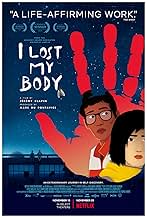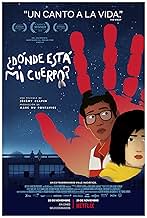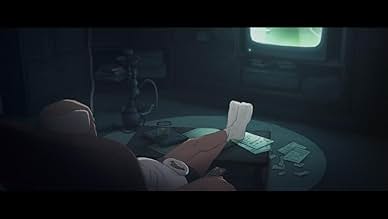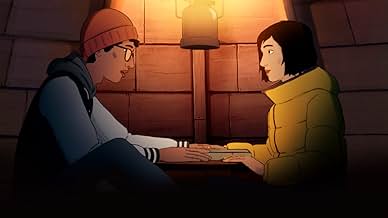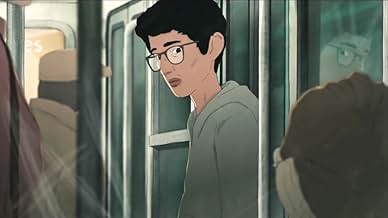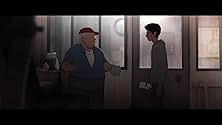La storia di Naoufel, un giovane uomo innamorato di Gabrielle. In un'altra parte della città, una mano mozzata fugge da un laboratorio di dissezione, determinata a ritrovare il suo corpo.La storia di Naoufel, un giovane uomo innamorato di Gabrielle. In un'altra parte della città, una mano mozzata fugge da un laboratorio di dissezione, determinata a ritrovare il suo corpo.La storia di Naoufel, un giovane uomo innamorato di Gabrielle. In un'altra parte della città, una mano mozzata fugge da un laboratorio di dissezione, determinata a ritrovare il suo corpo.
- Regia
- Sceneggiatura
- Star
- Candidato a 1 Oscar
- 32 vittorie e 57 candidature totali
- Naoufel
- (voce)
- Gigi
- (voce)
- Le père
- (voce)
- La mère
- (voce)
- La bibliothécaire
- (French version)
- (voce)
- (as Maud Le Guénédal)
- La copine de Raouf
- (French version)
- (voce)
- (as Déborah Grall)
- L'automobiliste
- (voce)
- …
- Sandra
- (English version)
- (voce)
Recensioni in evidenza
9.4/10
From the very first minutes, the picture attracts the viewer's attention with an unusual and peculiar drawing, which, as a rule, is characteristic of author's projects. The work of director Jeremy Klapen is immediately interesting due to the unusual presentation of the material, the initially incomprehensible concept of a severed hand that wanders through a predatory city, and the undoubtedly attractive soundtrack.
The material is fed through flashbacks of the main character Noufel, scenes of his current life and with the help of a separate story arc of the hand, so to speak. The further the creators move us through the story of a young man, the more the sad world of this young man opens up to us. The director skillfully pulls the viewer by these and other nerves, allowing him to plunge into the guy's world and identify himself with him. Watching the sad story of Noufel, who was once full of enthusiasm and dreamed of a lot: a bright future with his parents, a wonderful career, just a happy life. However, children's dreams can be naive, and fate disposes so that much is not destined to come true. So it became with Noufel. A young man lives a gray life, he is alone in this huge city, which in fact may well be predatory and dangerous. Sometimes it seems that he does not have a specific goal, he has already got used to his fate and is now simply trying to survive by working as a pizza deliveryman. His dreams of becoming an astronaut or a musician are now only in his memories, which are inextricably linked with his long-gone parents.
However, everything suddenly changes when Noufel literally falls in love with a girl, or rather with her voice, when the couple communicates over the intercom on a rainy evening. And then something flares up in the guy. He tries to rekindle the flame of life in himself, suddenly realizing that he is not able to be alone in this vast world.
Another storyline is a metaphorical journey of a severed hand in search of a lost body. At first, you don't even understand what kind of brush it is, and where it is in a hurry. But, believe me, closer to the final you will definitely understand. Everyone, I think, will draw their own conclusion, both about the lonely wandering hand and about the picture as a whole.
The severed brush, as I saw it, is all of us, every single person who somehow lost something important from childhood, the ability to see the world with children's eyes, the desire to comprehend new things and the feeling that everything is possible in this world. At some point, when you are already becoming an adult, you suddenly realize that there are a lot of difficulties, prohibitions, locks that are created by society and/or by yourself. In the cartoon, as I saw it, for Noufel, the starting point of no return was the departure of his parents, who did not allow him to recover and become what he so dreamed of. He had no support, he stopped striving himself. For the audience, it can be a lot of those points that everyone will think about independently and be sure to grieve on this topic, realizing how long ago the time when he was really free has passed.
Emotions from this picture are very difficult to convey in words, and to do it in such a way as to really interest a potential viewer, but believe me, you will be able to immerse yourself in this interesting deeply personal story. There is nothing masterpiece here, the plot is quite simple, but the general concept of the work closer to the finale will allow the cartoon to unfold in a way that the highest-quality dramas sometimes do not. Maybe this is just my perception of the picture, but viewing this work will definitely not be superfluous.
The music in the movie is just gorgeous. I want to listen to it again, it allows me to remind both about the work itself and about the warm inner feeling of sadness that I experienced when watching the cartoon. Jeremy Klapen's work earned a nomination for a prestigious award, but even more it taught me personally to see my life through the prism of the flow of time, bringing together everything that once happened to us. After all, this skill makes it clear how to make your life happier when you see the life of the main character of the picture. Each of us should learn to be at least a little happier than we are today. And such works help to find the way to this happiness in our difficult times.
8 out of 10.
This is more than a handy pun. Most of the primary elements of creating animation are included in the narrative. It has music--the boy's mother played the cello, and he and a blind man play the piano. The boy also collected audio on a cassette recorder (a device which also serves a critical function in the overcoming of the heroes' obstacles). Also notice the focus in the story on disembodied dialogue (e.g. the pizza delivery scene), which is what voice acting consists of, and on sound effects (e.g. the sound of wind from pressing one's hand to their ear). Besides the promise of a generic romantic coupling, the girl's role here also is in the writing department. She's a librarian and recommends to him a novel, "The World According to Garp," which itself is a piece of multi-layered, self-referential fiction about a writer and writing. Additionally, the boy borrows books about igloos from the library, which provides him with inspiration for his architectural designs. Thus, we have design (architectural and written), a soundtrack and a score. All that's left is to build the visuals of the animation. For that, he becomes a carpenter's apprentice--using, as his employer gives a helping hand, tools, accessories and instruments to transform the material, wood, which comes from the same stuff the paper animators used to draw films on did.
Note that only then does the hand's separate story begin, from an "accident" of carpentry. Film is a process of reanimation; in live action especially, but also, through inspiration or as reference, in animation as well, film captures something alive--something animated--then kills and makes it inanimate as still images before, finally, reanimating what was once captured as the projected (or Netflix streamed, as the case may be) motion picture that the spectator views. Likewise, the hand's individual adventure begins when he is captured by the electric saw; next, the hand lies dead before becoming reanimated as something entirely different from what it once was. In other words, the disembodied hand here is a metaphor for film and, specifically, animated film. It's the film-within-the-film, the hand's journey nested between the outer story of the boy's making of that story, along with the girl as being something of our on-screen surrogate spectator.
Unlike in live action, these drawn compositions don't necessitate a physical camera. This provides a free hand to the perspective of the picture, the theoretical camera's eye, which in turn becomes the spectator's shared vantage point, to be limited only by the filmmakers' imagination. The handling of that camera here is where "I Lost My Body" most excels visually in my estimation. In addition to alternating between color and black-and-white palettes and 2D and 3D computer animation, there's some shifting in perspectives. We and the camera are sometimes like a fly--oblivious, perhaps, to the characters when we're at a distance on a wall, but a nuisance when we swoop in or rest too close upon them. Other times, we share the point of view of this or that character--both what they see in the outside world and, through memories and fantasies, what they imagine with their mind's eye. At one point, we're just a disembodied eyeball resting on a floor. We may even be a reflection in a subway mirror as we witness a hand hiding under a ravioli can scurrying by. (By the way, does anyone else sense a dig at Pixar--specifically "Ratatouille" (2007) with this sequence involving rats, but with other scenes, too, such as floating through the wind (albeit it with an umbrella instead of balloons) between cars, and I can't think of any better reason for the astronaut business here. It would be fitting since, after all, Pixar largely killed traditional animation.)
Even better here is the attempt, which seems specifically more suited to animation because of how it's made, to expand the sensory stimuli by adding texture and a motif of the hand feeling the physical world around it. We experience movies, to paraphrase Charlie Chaplin, as movement, two planes and a suggestion of depth; it's something we've always seen and, later, also heard. Of course, we also feel emotionally and physically in response to the audio-visual experience. Thus, sure, "I Lost My Body" is touching, but, moreover, its tactile focus, hand-in-hand with its self-reflexive framework, almost gives the impression that it's a movie we can feel, to reach out and touch back.
Lo sapevi?
- QuizMarks the first time a feature-length animation has won prestigious Cannes parallel selection, Critics' Week Grand Prize.
- BlooperThe map on the bathroom door mistakenly reads Turkey above Greece whereas the name Greece (as well as the countries above it) is omitted.
- Citazioni
Naoufel: Do you believe in fate? No, seriously.
Gabrielle: That everything is written in advance? That we follow a trajectory?
Naoufel: Yeah
Gabrielle: And that we can't change anything?
Naoufel: We think that we can, but we can't. It's an illusion. Unless we do... Something completely unpredictable and irrational. It's the only way to conjure the spell for good.
- ConnessioniFeatured in 47th Annie Awards (2020)
I più visti
- How long is I Lost My Body?Powered by Alexa
Dettagli
- Data di uscita
- Paesi di origine
- Siti ufficiali
- Lingua
- Celebre anche come
- I Lost My Body
- Aziende produttrici
- Vedi altri crediti dell’azienda su IMDbPro
Botteghino
- Lordo in tutto il mondo
- 1.136.431 USD
- Tempo di esecuzione1 ora 21 minuti
- Colore
- Mix di suoni
- Proporzioni
- 2.35 : 1
Contribuisci a questa pagina


![Guarda Bande-annonce [OV]](https://m.media-amazon.com/images/M/MV5BMzE5OTZhZDItNTgzYy00NGYwLWJlZjQtZjU0OTI3YjliZThhXkEyXkFqcGdeQXRyYW5zY29kZS13b3JrZmxvdw@@._V1_QL75_UX500_CR0)
![Bande-annonce Teaser [OV]](https://m.media-amazon.com/images/M/MV5BYjU0NzM3ZDctYWYyMS00ZjQyLTlhMDMtZmI0YzdmM2JlNGMxXkEyXkFqcGdeQXRyYW5zY29kZS13b3JrZmxvdw@@._V1_QL75_UX500_CR0)




